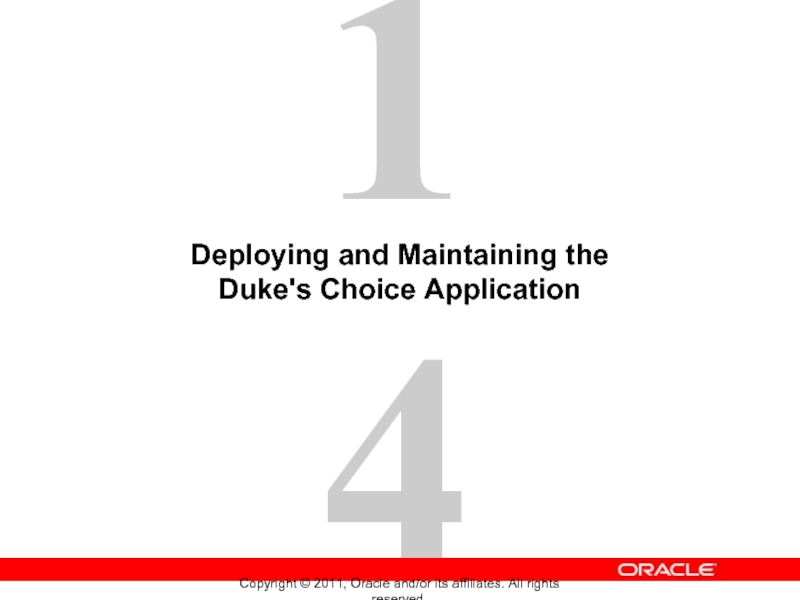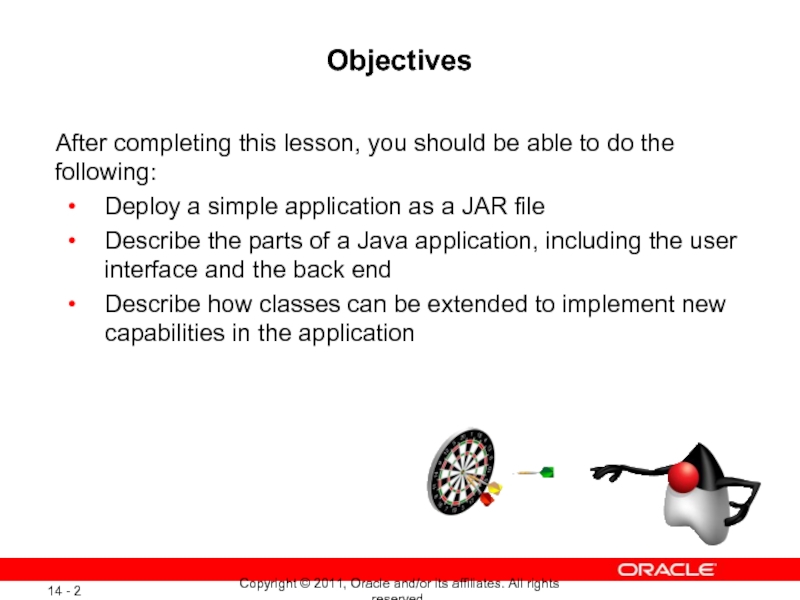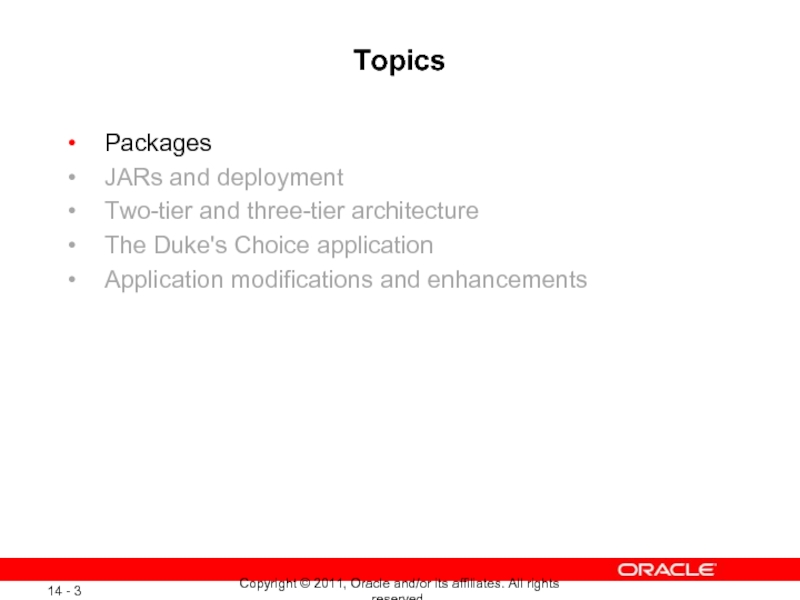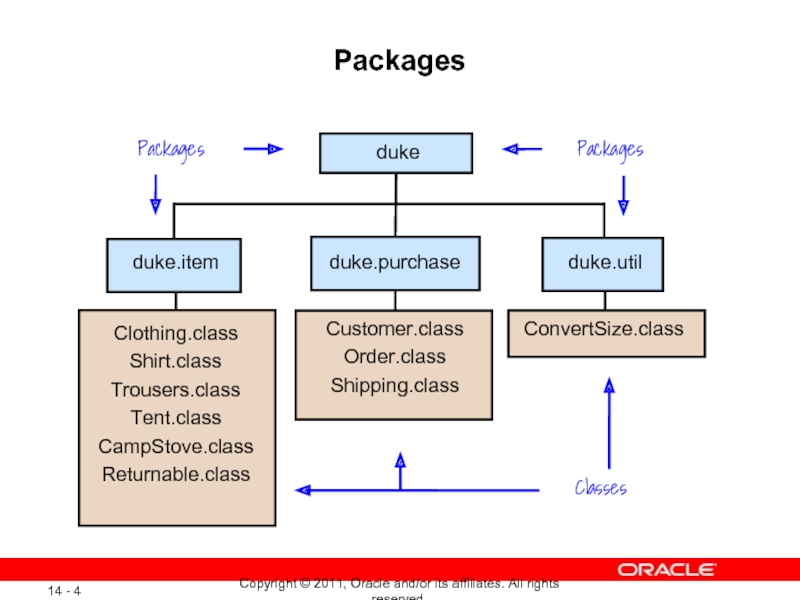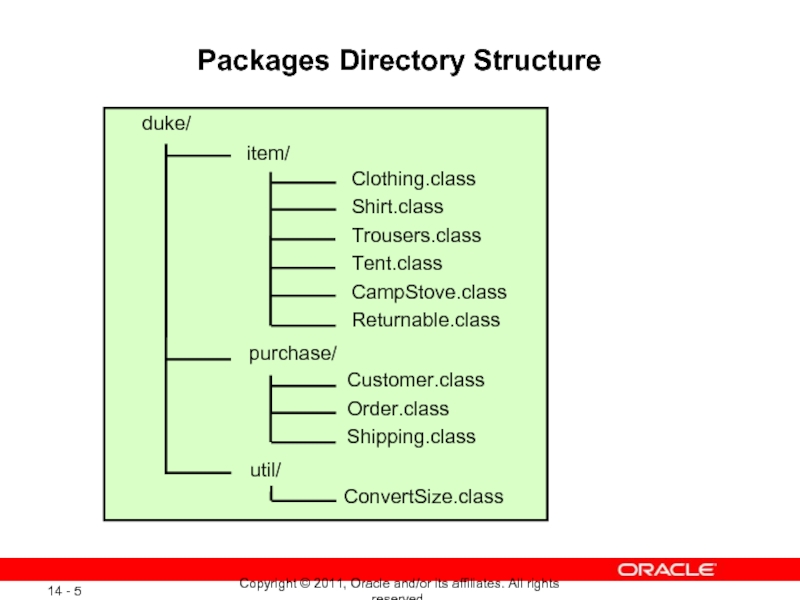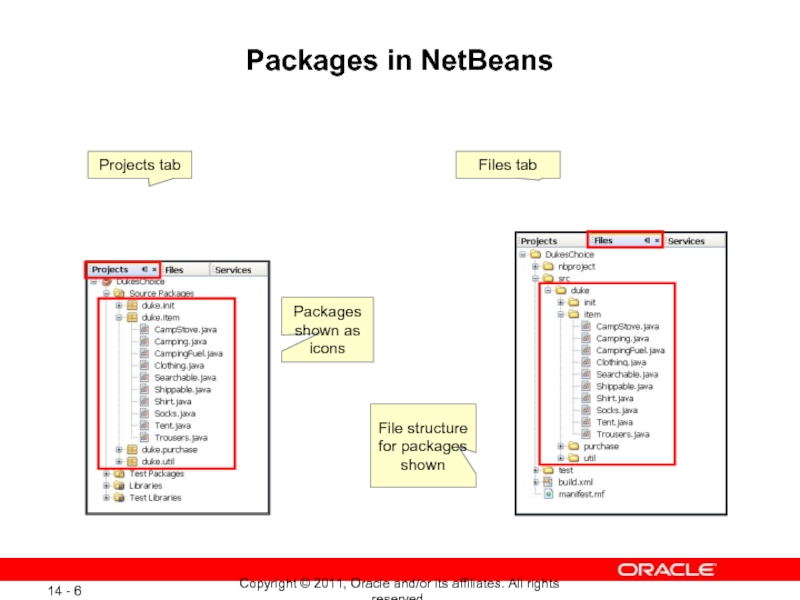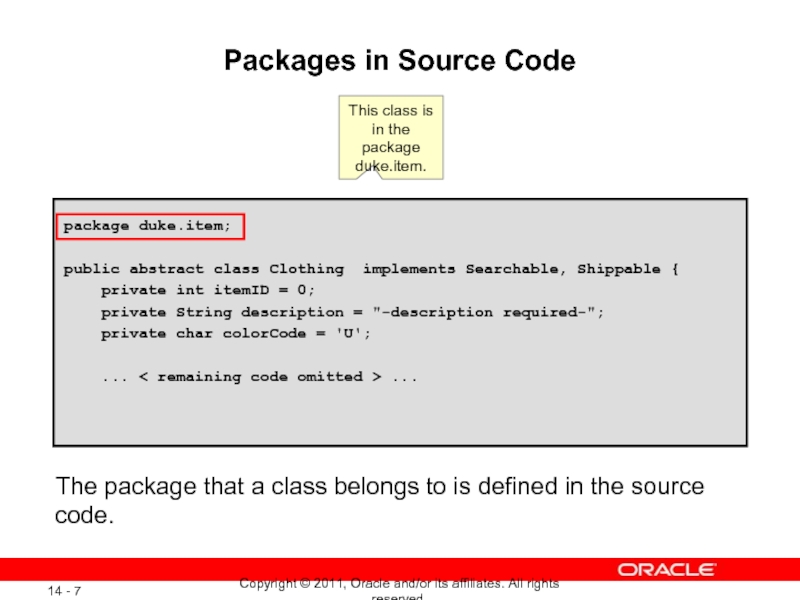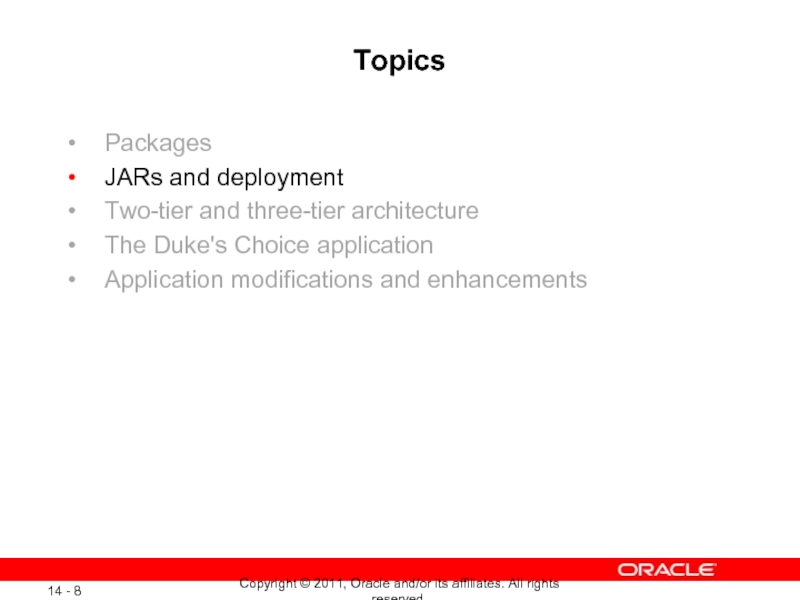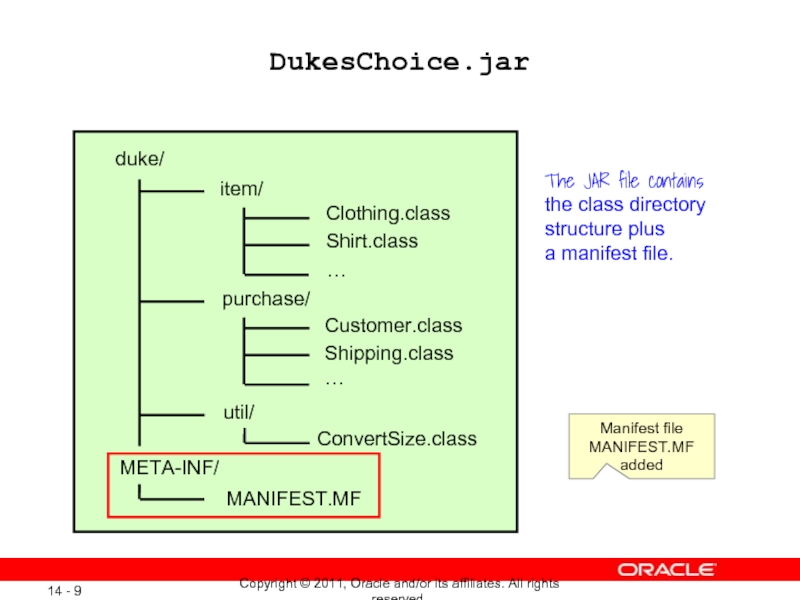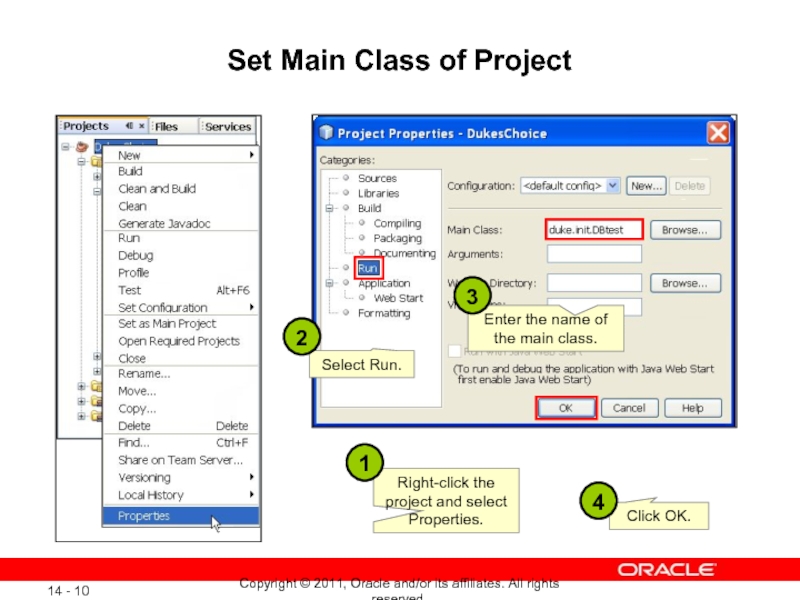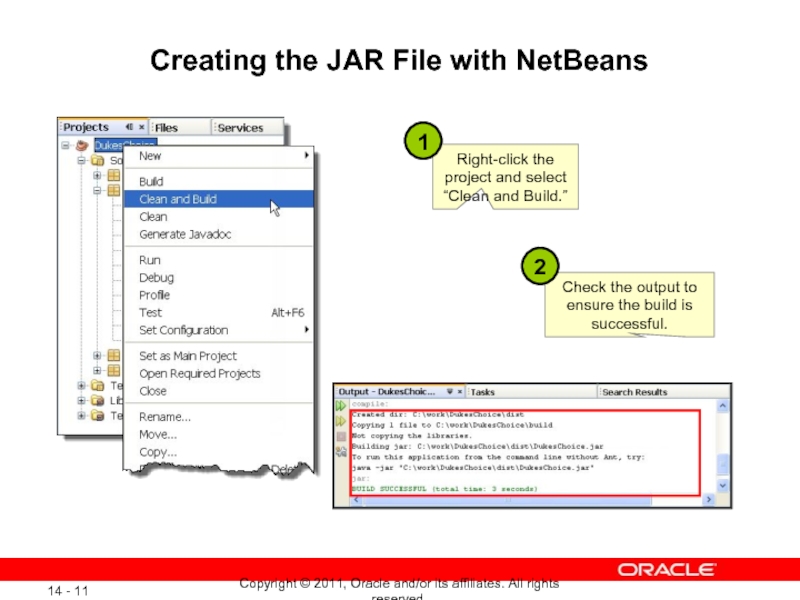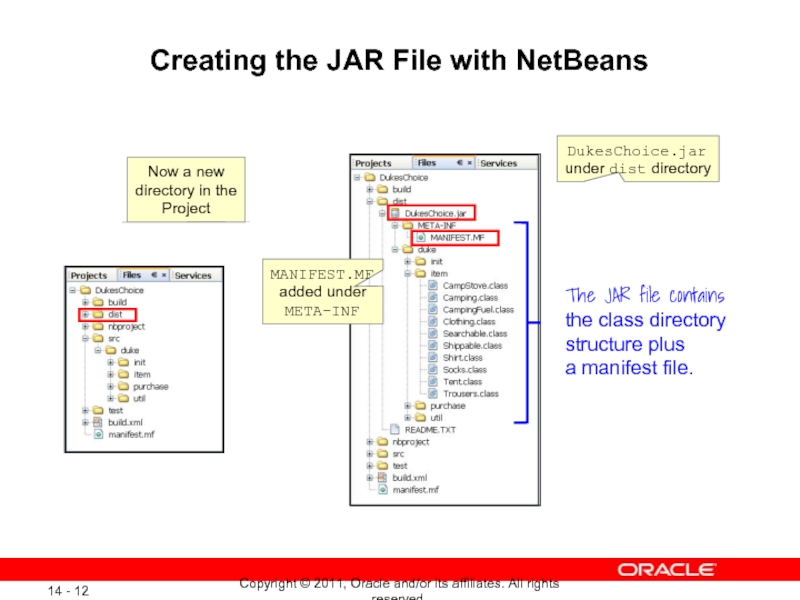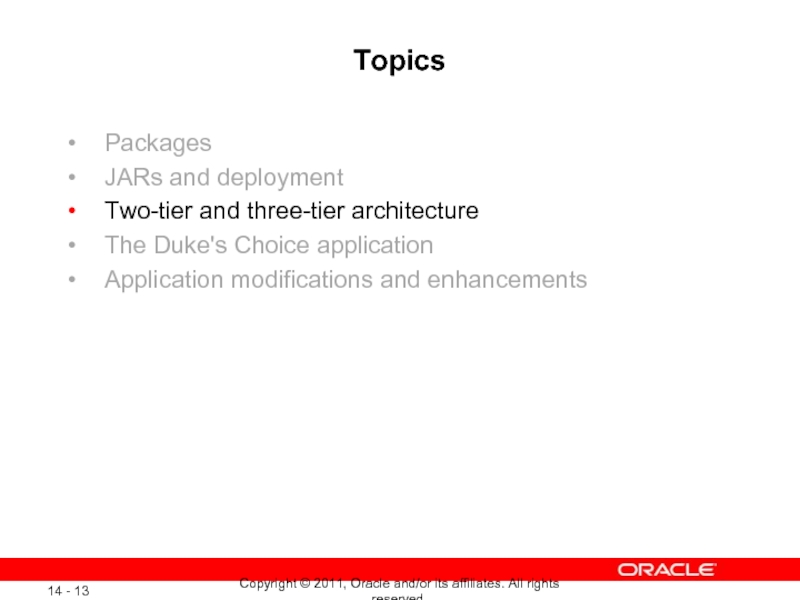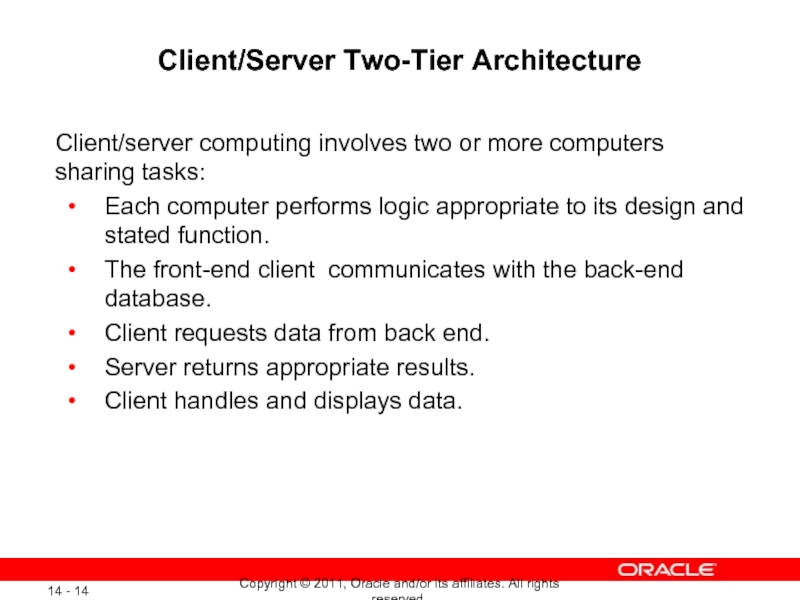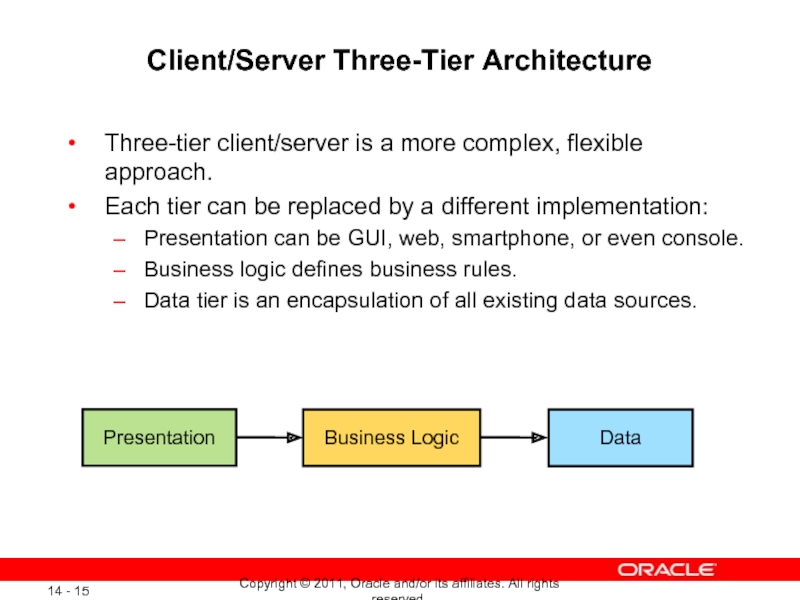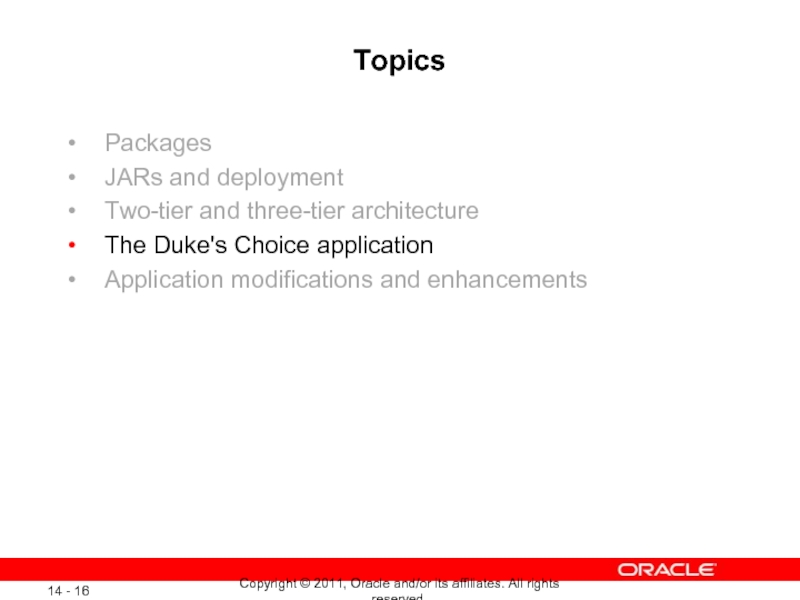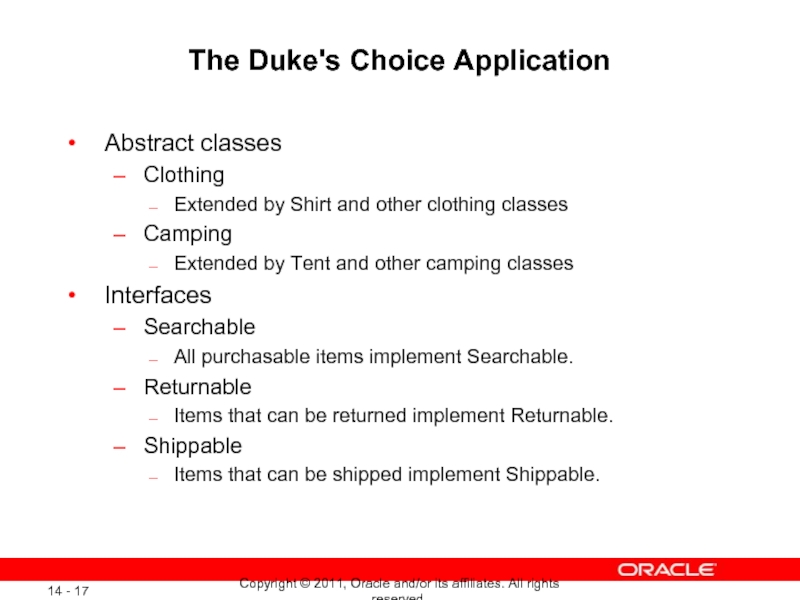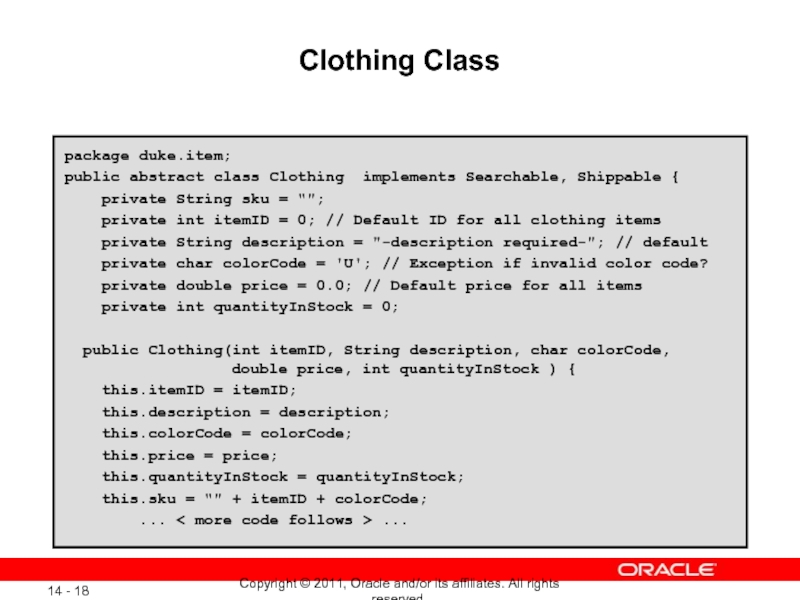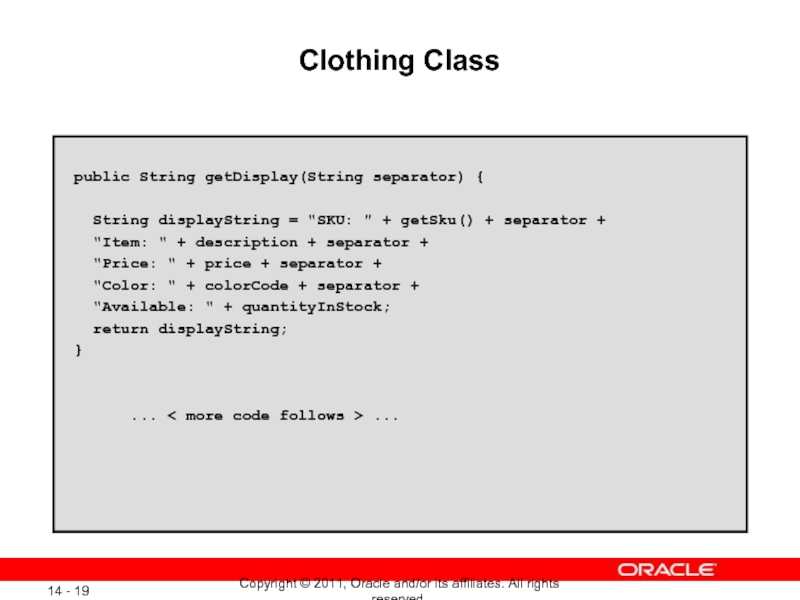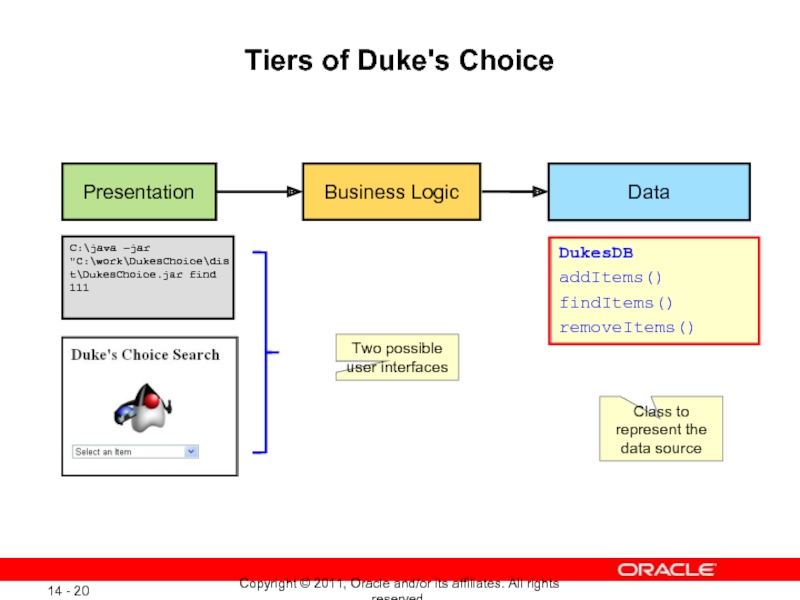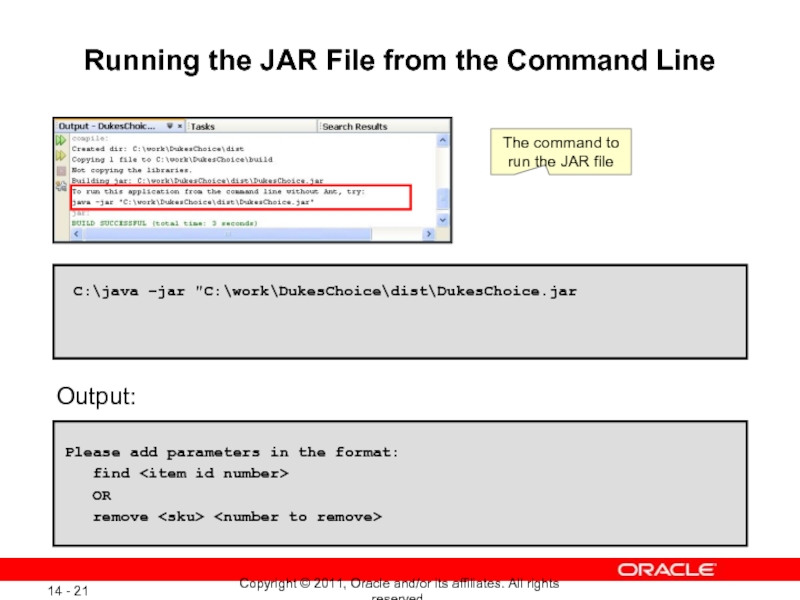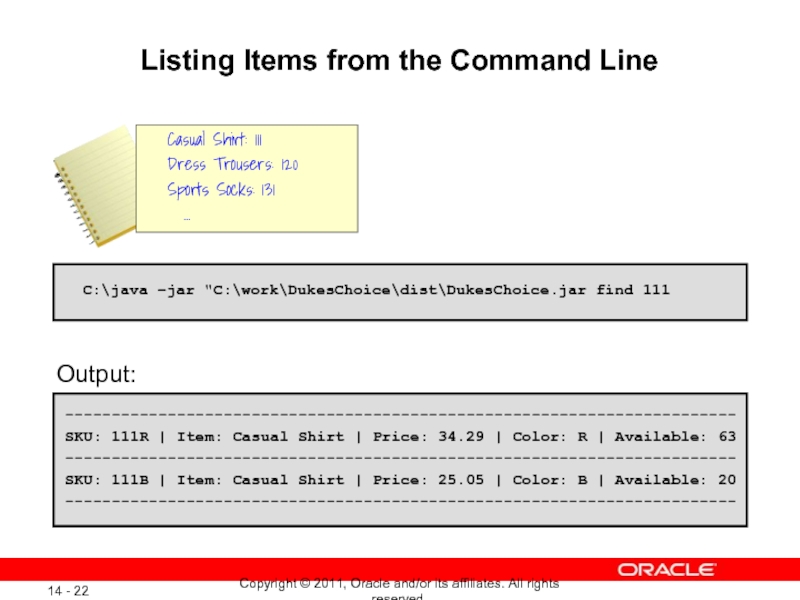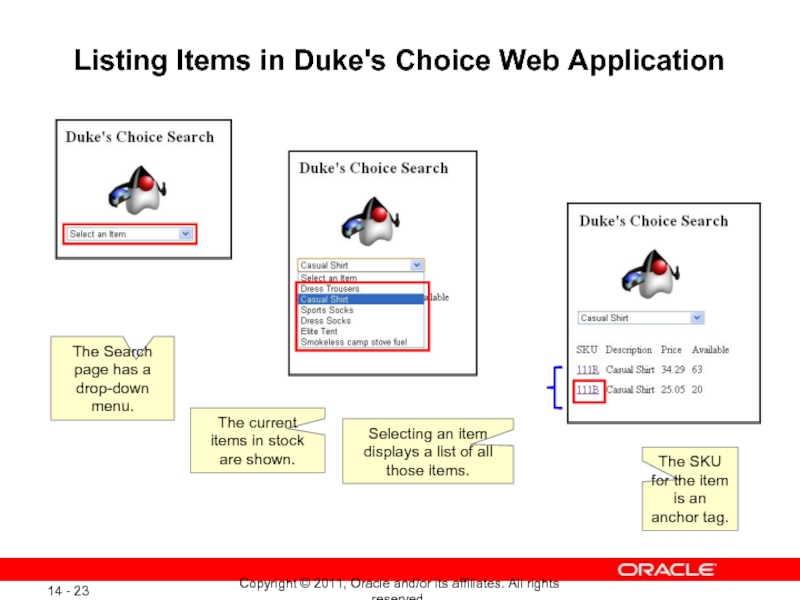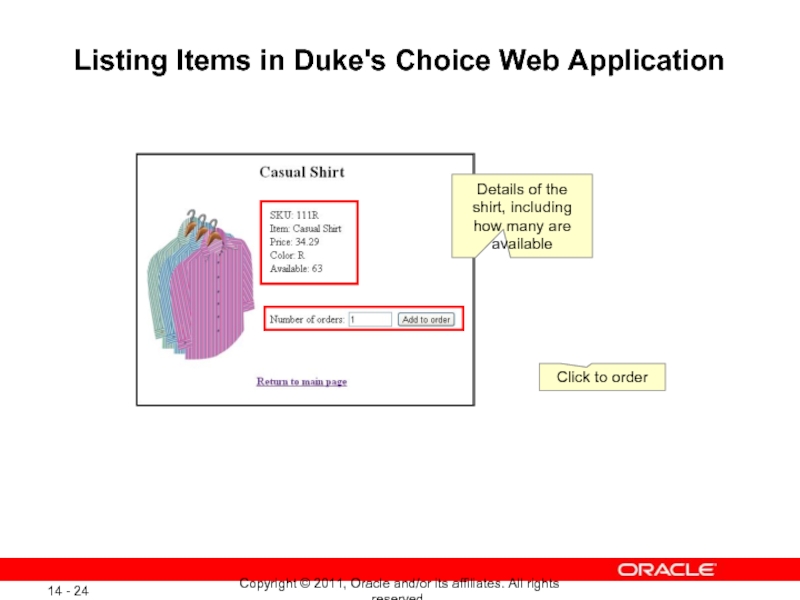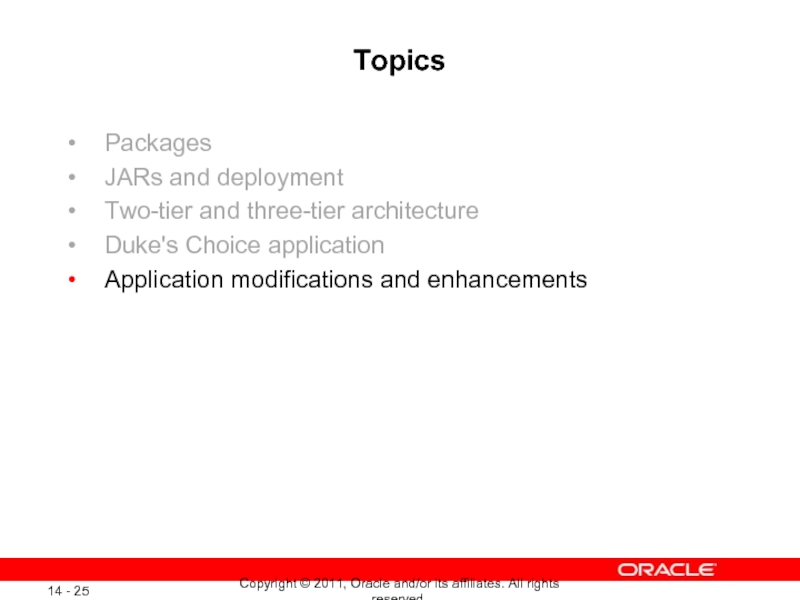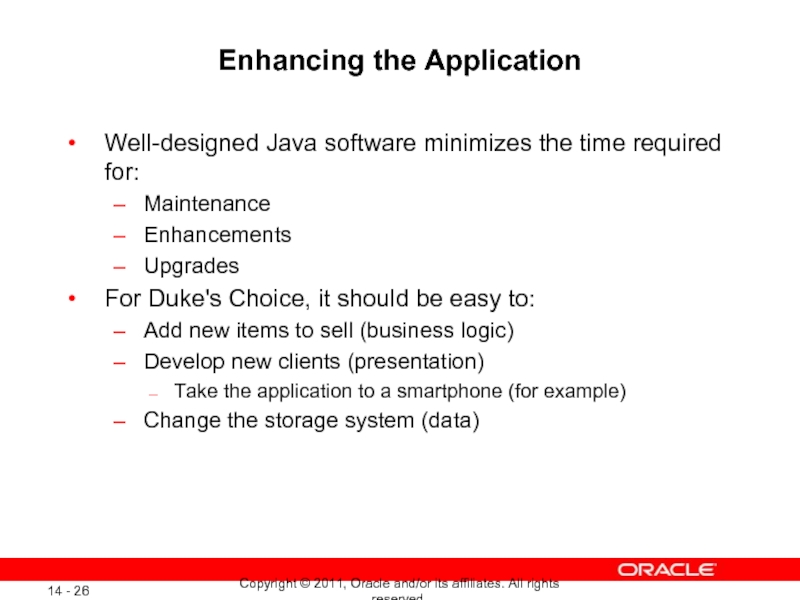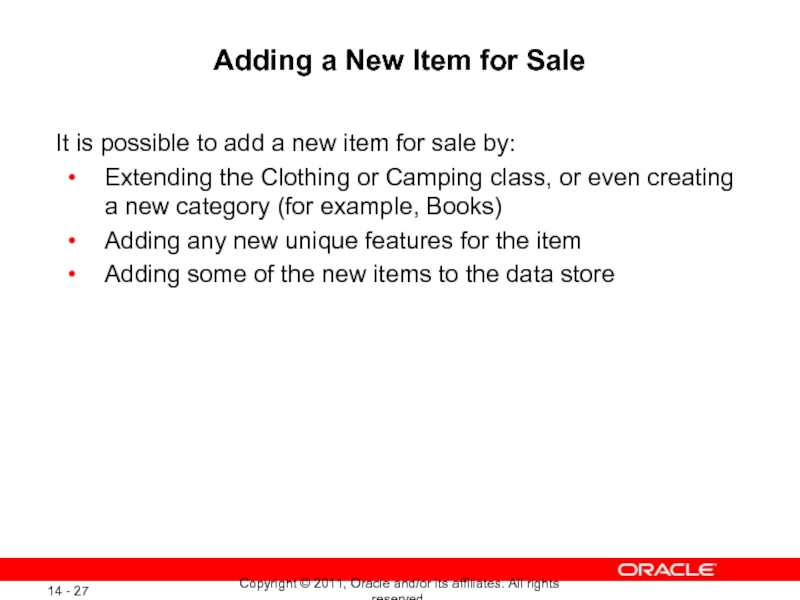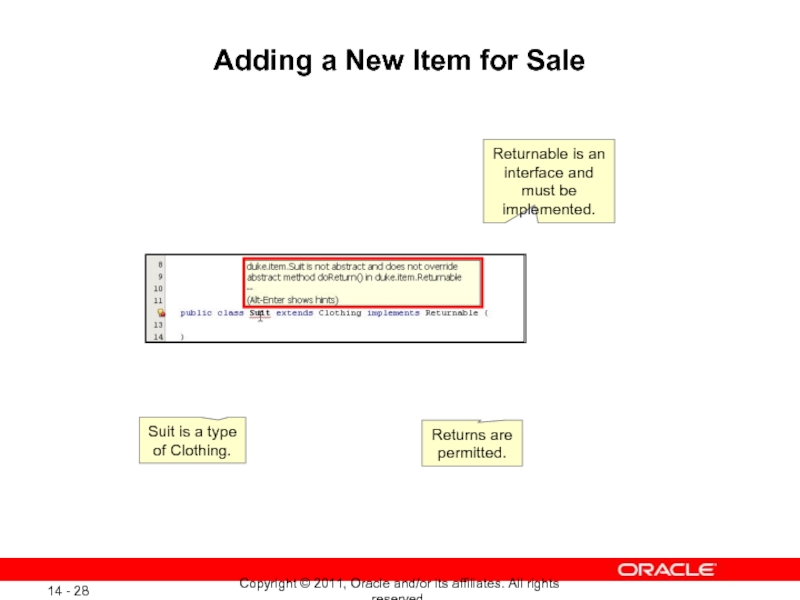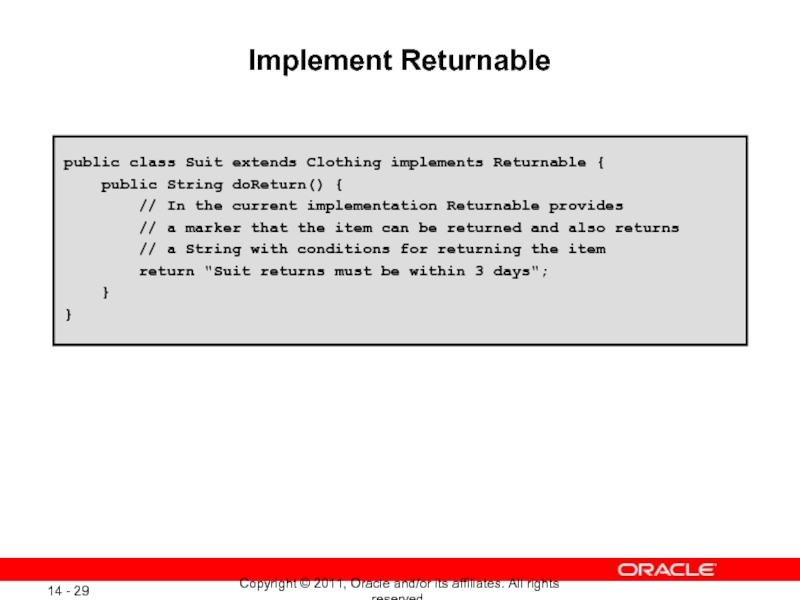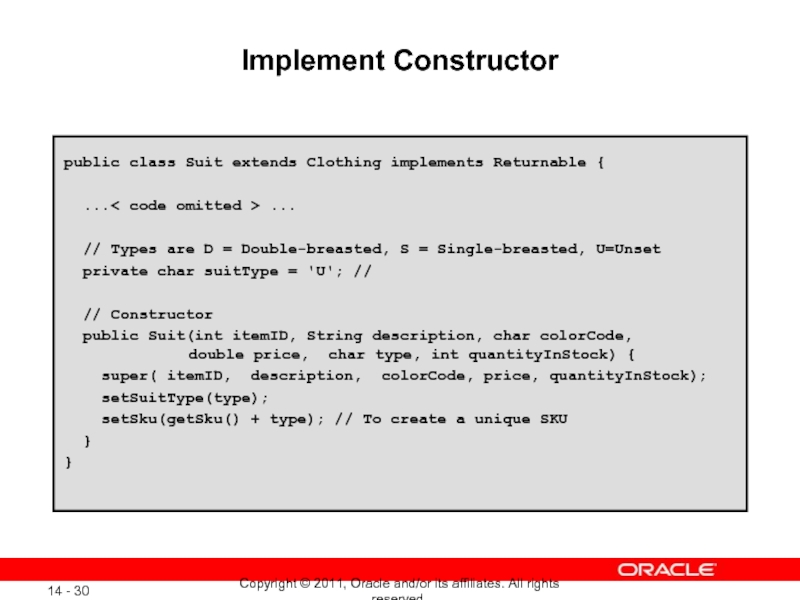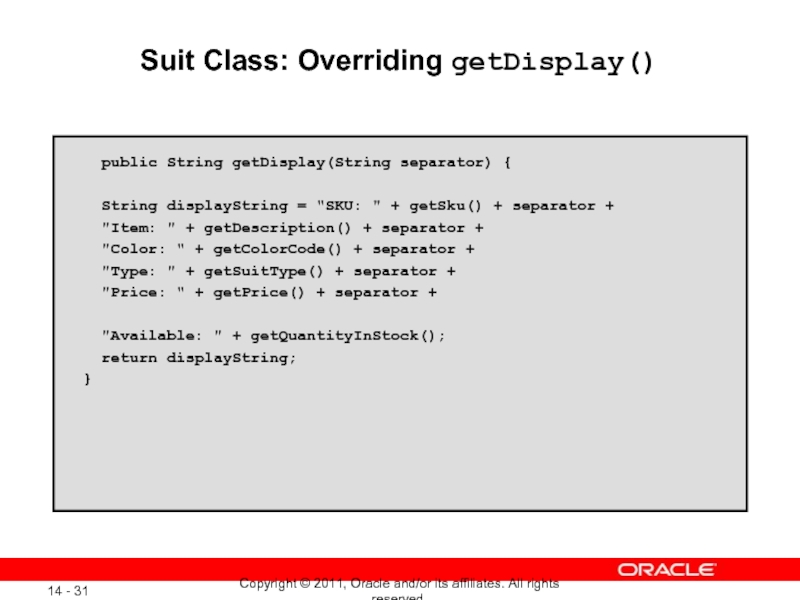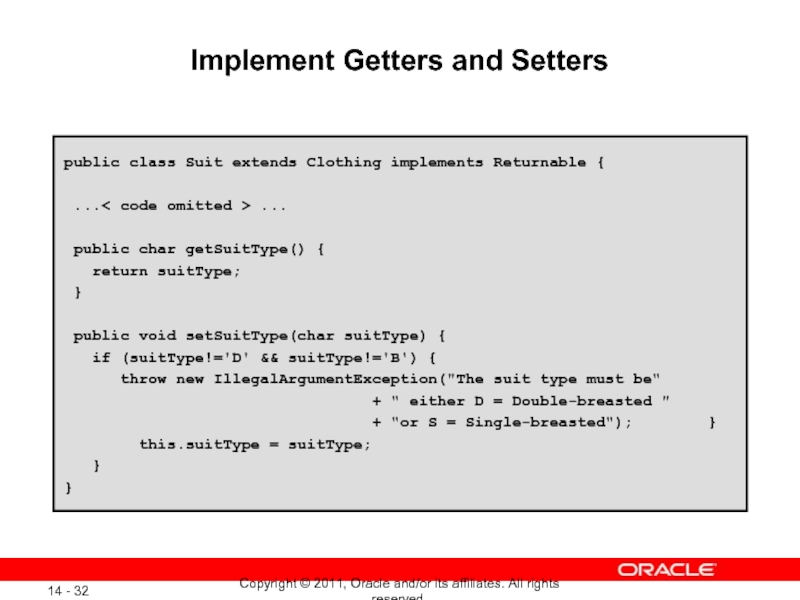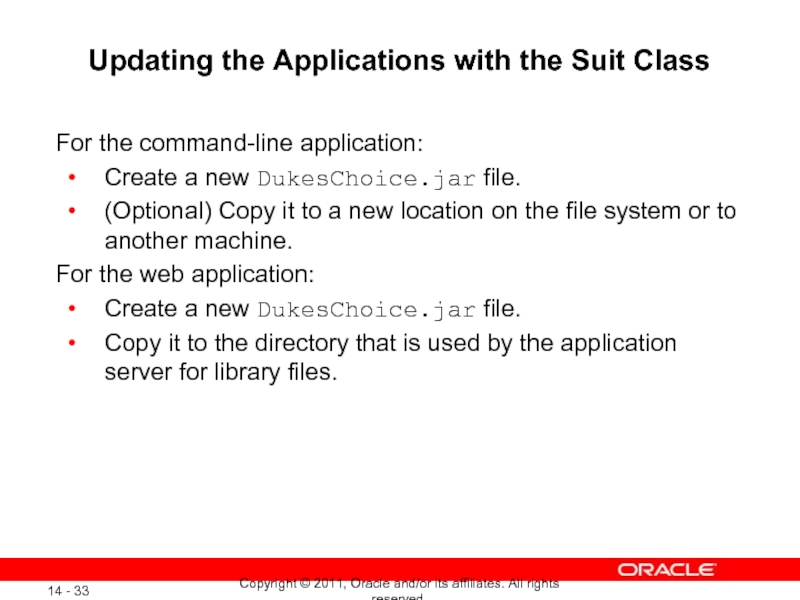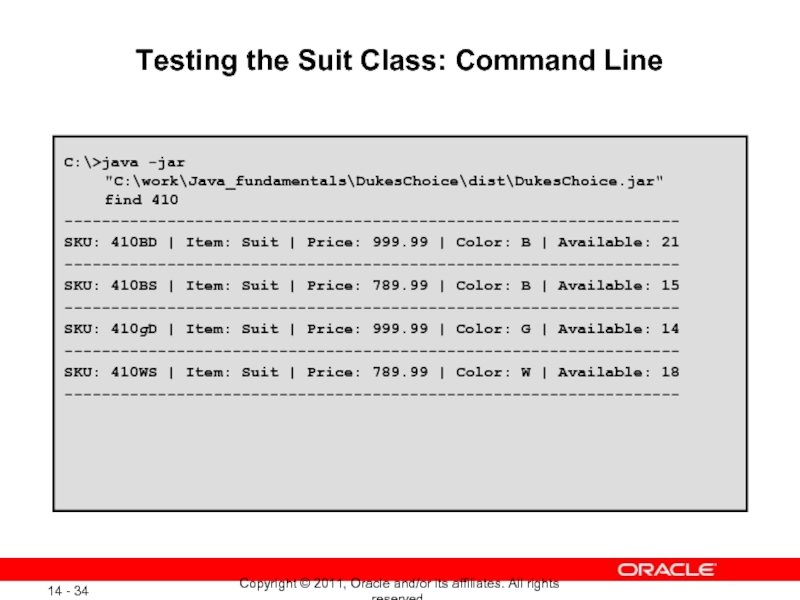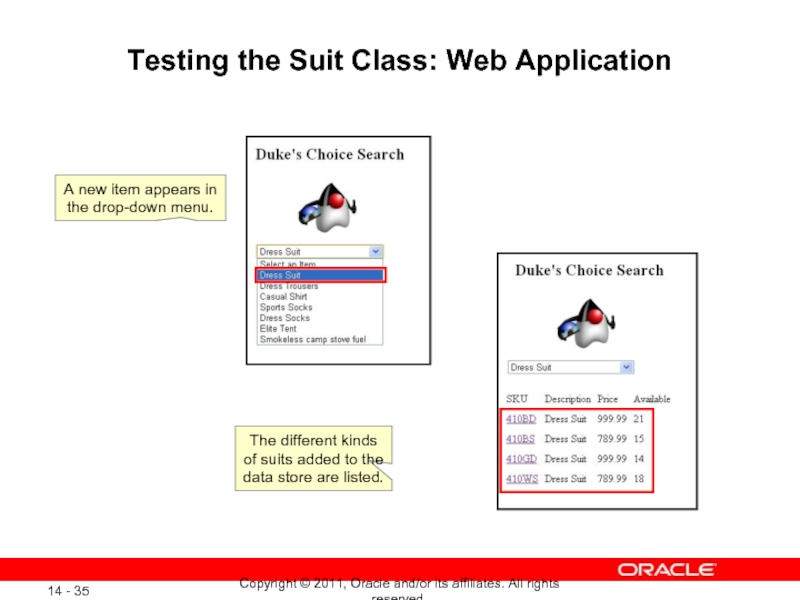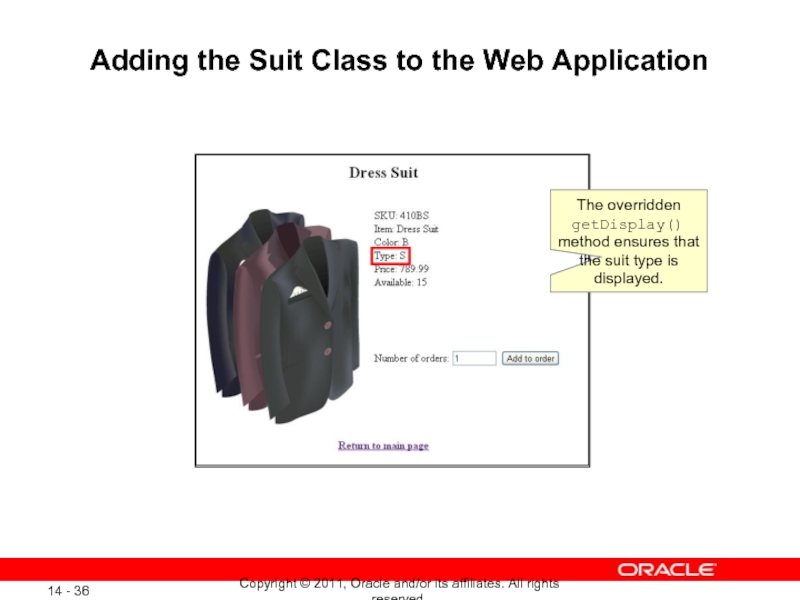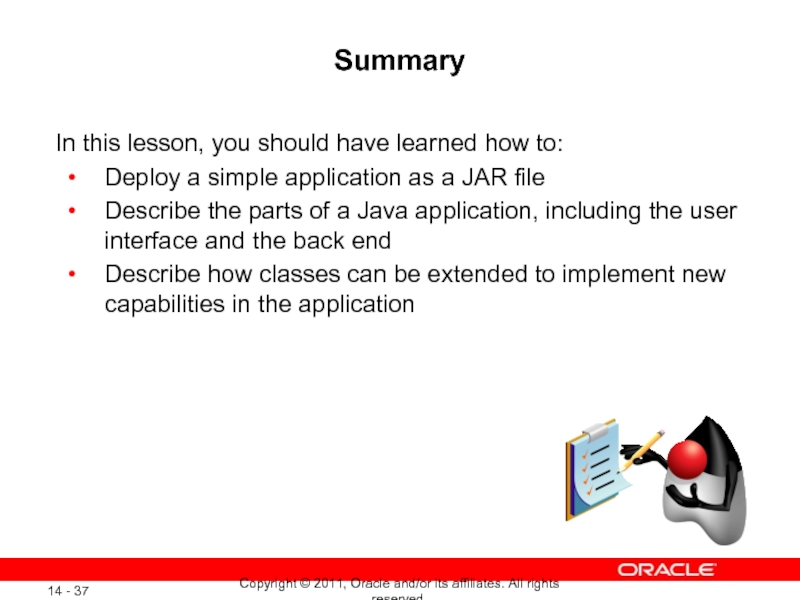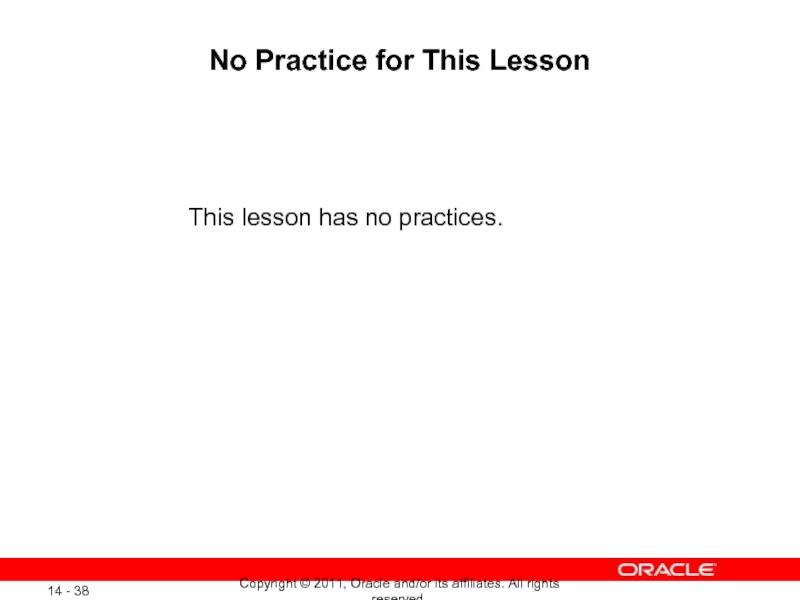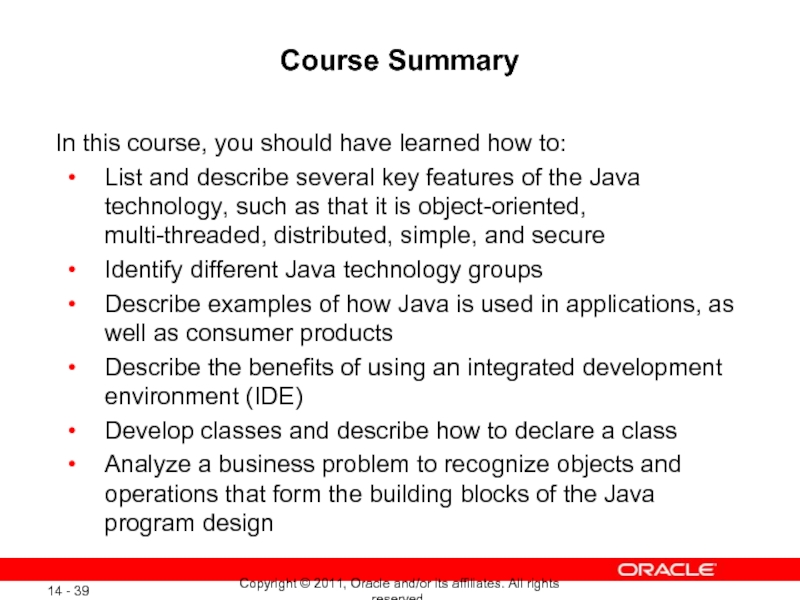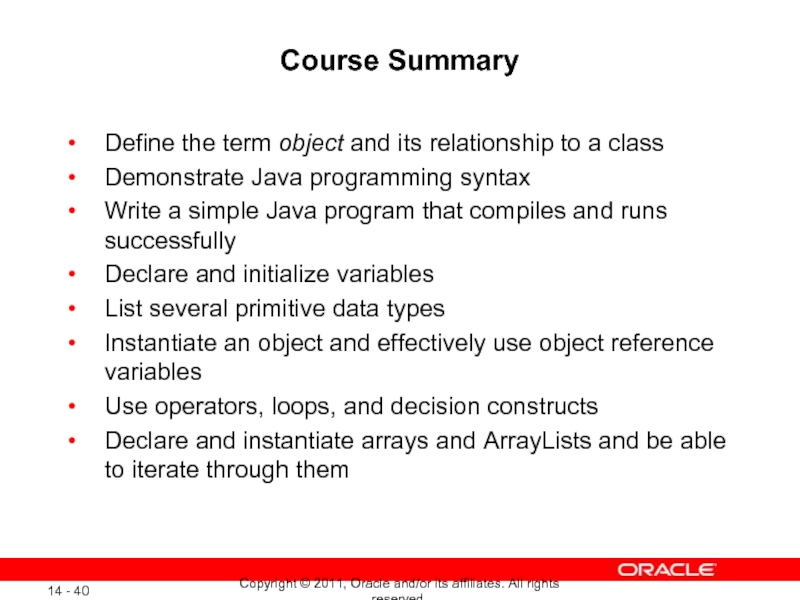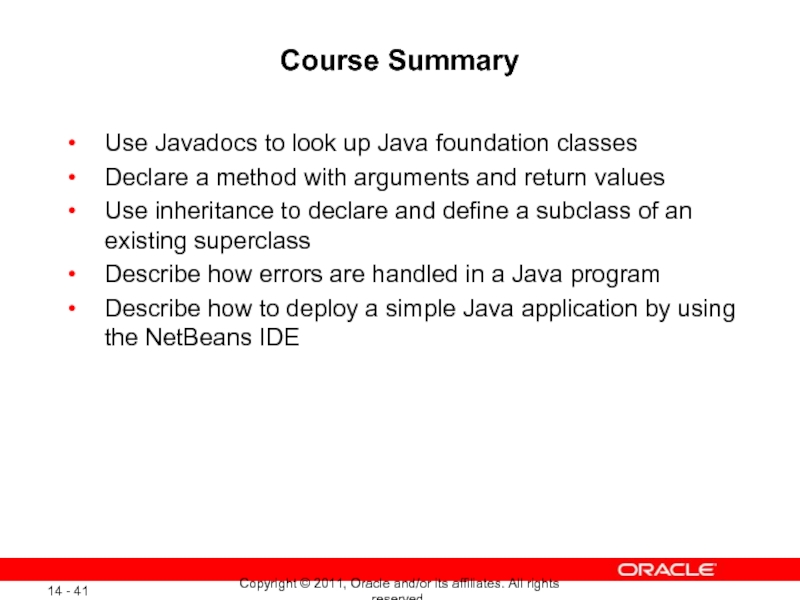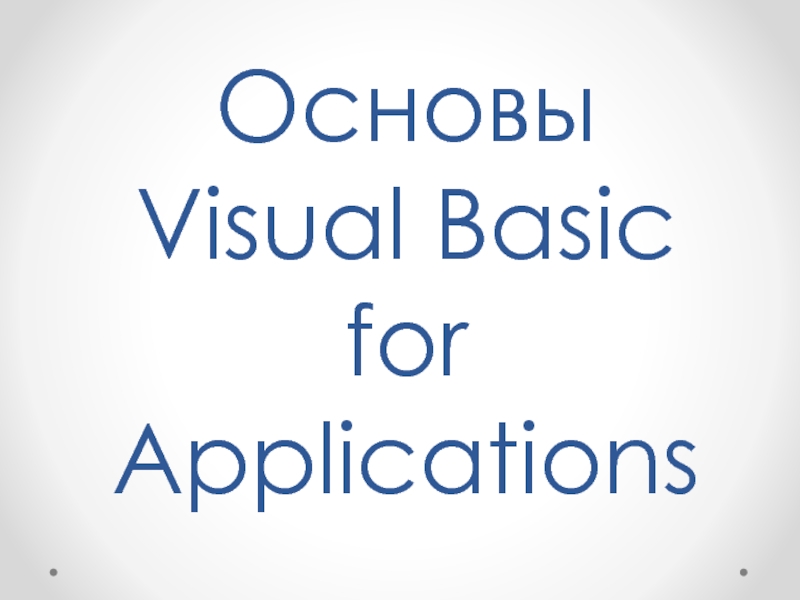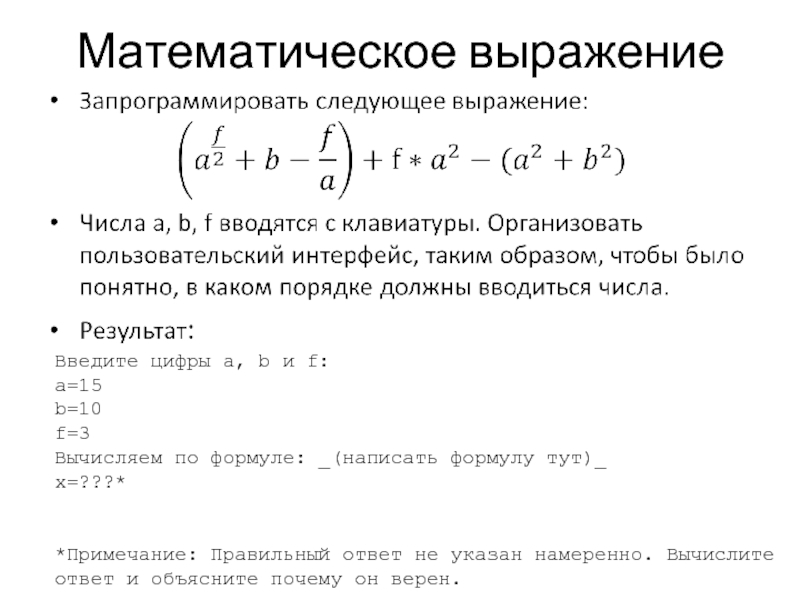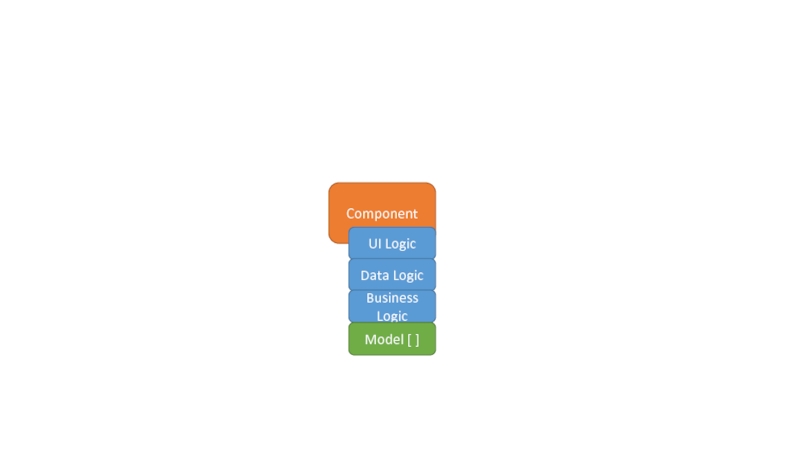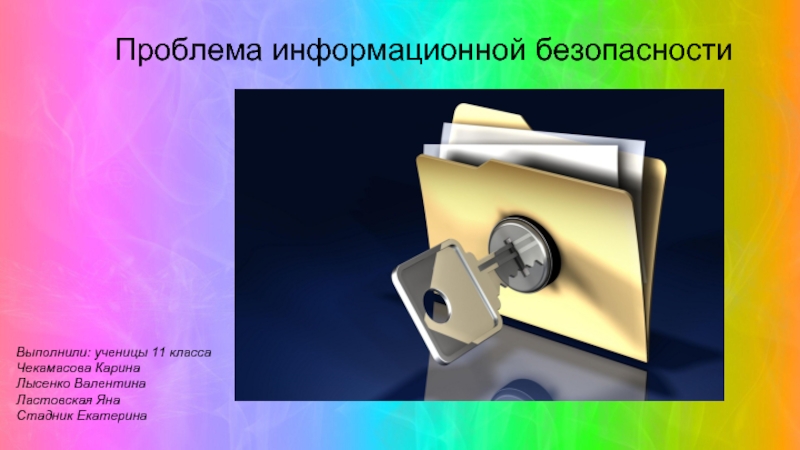- Главная
- Разное
- Дизайн
- Бизнес и предпринимательство
- Аналитика
- Образование
- Развлечения
- Красота и здоровье
- Финансы
- Государство
- Путешествия
- Спорт
- Недвижимость
- Армия
- Графика
- Культурология
- Еда и кулинария
- Лингвистика
- Английский язык
- Астрономия
- Алгебра
- Биология
- География
- Детские презентации
- Информатика
- История
- Литература
- Маркетинг
- Математика
- Медицина
- Менеджмент
- Музыка
- МХК
- Немецкий язык
- ОБЖ
- Обществознание
- Окружающий мир
- Педагогика
- Русский язык
- Технология
- Физика
- Философия
- Химия
- Шаблоны, картинки для презентаций
- Экология
- Экономика
- Юриспруденция
Deploying and Maintaining the Duke's Choice Application презентация
Содержание
- 1. Deploying and Maintaining the Duke's Choice Application
- 2. Objectives After completing this lesson, you should
- 3. Topics Packages JARs and deployment Two-tier and
- 4. Packages duke duke.purchase
- 5. Packages Directory Structure duke/ item/ purchase/
- 6. Packages in NetBeans Projects tab
- 7. Packages in Source Code The package
- 8. Topics Packages JARs and deployment Two-tier and
- 9. DukesChoice.jar duke/ item/ purchase/ ConvertSize.class Clothing.class
- 10. Set Main Class of Project Right-click
- 11. Creating the JAR File with NetBeans
- 12. Creating the JAR File with NetBeans
- 13. Topics Packages JARs and deployment Two-tier and
- 14. Client/Server Two-Tier Architecture Client/server computing involves two
- 15. Client/Server Three-Tier Architecture Three-tier client/server is a
- 16. Topics Packages JARs and deployment Two-tier and
- 17. The Duke's Choice Application Abstract classes
- 18. Clothing Class package duke.item; public abstract
- 19. Clothing Class public String
- 20. Presentation Tiers of Duke's Choice Business Logic
- 21. Running the JAR File from the Command
- 22. Listing Items from the Command
- 23. Listing Items in Duke's Choice Web Application
- 24. Listing Items in Duke's Choice Web Application
- 25. Topics Packages JARs and deployment Two-tier and
- 26. Enhancing the Application Well-designed Java software minimizes
- 27. Adding a New Item for Sale It
- 28. Adding a New Item for Sale
- 29. Implement Returnable public class Suit
- 30. Implement Constructor public class Suit
- 31. Suit Class: Overriding getDisplay()
- 32. Implement Getters and Setters public
- 33. Updating the Applications with the Suit Class
- 34. Testing the Suit Class: Command Line
- 35. Testing the Suit Class: Web Application
- 36. Adding the Suit Class to the Web
- 37. Summary In this lesson, you should have
- 38. No Practice for This Lesson This lesson has no practices.
- 39. Course Summary In this course, you
- 40. Course Summary Define the term object
- 41. Course Summary Use Javadocs to look
Слайд 2Objectives
After completing this lesson, you should be able to do the
Deploy a simple application as a JAR file
Describe the parts of a Java application, including the user interface and the back end
Describe how classes can be extended to implement new capabilities in the application
Слайд 3Topics
Packages
JARs and deployment
Two-tier and three-tier architecture
The Duke's Choice application
Application modifications and
Слайд 4
Packages
duke
duke.purchase
duke.util
ConvertSize.class
Classes
Packages
Packages
Customer.class
Order.class
Shipping.class
Clothing.class
Shirt.class
Trousers.class
Tent.class
CampStove.class
Returnable.class
duke.item
Слайд 5
Packages Directory Structure
duke/
item/
purchase/
ConvertSize.class
Clothing.class
Shirt.class
Trousers.class
Tent.class
CampStove.class
Returnable.class
Customer.class
Order.class
Shipping.class
util/
Слайд 6Packages in NetBeans
Projects tab
Packages shown as icons
Files tab
File
Слайд 7
Packages in Source Code
The package that a class belongs to is
package duke.item;
public abstract class Clothing implements Searchable, Shippable {
private int itemID = 0;
private String description = "-description required-";
private char colorCode = 'U';
... < remaining code omitted > ...
This class is in the package duke.item.
Слайд 8Topics
Packages
JARs and deployment
Two-tier and three-tier architecture
The Duke's Choice application
Application modifications and
Слайд 9
DukesChoice.jar
duke/
item/
purchase/
ConvertSize.class
Clothing.class
Shirt.class
…
Customer.class
Shipping.class
…
util/
MANIFEST.MF
META-INF/
The JAR file contains
the class directory
structure plus
a manifest
Manifest file MANIFEST.MF
added
Слайд 10Set Main Class of Project
Right-click the project and select Properties.
1
Select Run.
2
Enter
3
Click OK.
4
Слайд 11Creating the JAR File with NetBeans
Right-click the project and select “Clean
Check the output to ensure the build is successful.
1
2
Слайд 12Creating the JAR File with NetBeans
Now a new directory in the
DukesChoice.jar under dist directory
The JAR file contains
the class directory
structure plus
a manifest file.
MANIFEST.MF added under META-INF
Слайд 13Topics
Packages
JARs and deployment
Two-tier and three-tier architecture
The Duke's Choice application
Application modifications and
Слайд 14Client/Server Two-Tier Architecture
Client/server computing involves two or more computers sharing tasks:
Each
The front-end client communicates with the back-end database.
Client requests data from back end.
Server returns appropriate results.
Client handles and displays data.
Слайд 15Client/Server Three-Tier Architecture
Three-tier client/server is a more complex, flexible approach.
Each tier
Presentation can be GUI, web, smartphone, or even console.
Business logic defines business rules.
Data tier is an encapsulation of all existing data sources.
Presentation
Business Logic
Data
Слайд 16Topics
Packages
JARs and deployment
Two-tier and three-tier architecture
The Duke's Choice application
Application modifications and
Слайд 17The Duke's Choice Application
Abstract classes
Clothing
Extended by Shirt and other clothing
Camping
Extended by Tent and other camping classes
Interfaces
Searchable
All purchasable items implement Searchable.
Returnable
Items that can be returned implement Returnable.
Shippable
Items that can be shipped implement Shippable.
Слайд 18Clothing Class
package duke.item;
public abstract class Clothing implements Searchable, Shippable {
private int itemID = 0; // Default ID for all clothing items
private String description = "-description required-"; // default
private char colorCode = 'U'; // Exception if invalid color code?
private double price = 0.0; // Default price for all items
private int quantityInStock = 0;
public Clothing(int itemID, String description, char colorCode, double price, int quantityInStock ) {
this.itemID = itemID;
this.description = description;
this.colorCode = colorCode;
this.price = price;
this.quantityInStock = quantityInStock;
this.sku = "" + itemID + colorCode;
... < more code follows > ...
Слайд 19Clothing Class
public String getDisplay(String separator) {
String
"Item: " + description + separator +
"Price: " + price + separator +
"Color: " + colorCode + separator +
"Available: " + quantityInStock;
return displayString;
}
... < more code follows > ...
Слайд 20Presentation
Tiers of Duke's Choice
Business Logic
Data
C:\java –jar "C:\work\DukesChoice\dist\DukesChoice.jar find 111
DukesDB
addItems()
findItems()
removeItems()
Class to represent
Two possible user interfaces
Слайд 21Running the JAR File from the Command Line
C:\java –jar "C:\work\DukesChoice\dist\DukesChoice.jar
Output:
The command to run the JAR file
Please add parameters in the format:
find
OR
remove
Слайд 22
Listing Items from the Command Line
C:\java –jar "C:\work\DukesChoice\dist\DukesChoice.jar find 111
Output:
------------------------------------------------------------------------
SKU:
------------------------------------------------------------------------
SKU: 111B | Item: Casual Shirt | Price: 25.05 | Color: B | Available: 20
------------------------------------------------------------------------
Слайд 23Listing Items in Duke's Choice Web Application
The Search page has a
The current items in stock are shown.
Selecting an item displays a list of all those items.
The SKU for the item is an anchor tag.
Слайд 24Listing Items in Duke's Choice Web Application
Details of the shirt, including
Click to order
Слайд 25Topics
Packages
JARs and deployment
Two-tier and three-tier architecture
Duke's Choice application
Application modifications and enhancements
Слайд 26Enhancing the Application
Well-designed Java software minimizes the time required for:
Maintenance
Enhancements
Upgrades
For Duke's
Add new items to sell (business logic)
Develop new clients (presentation)
Take the application to a smartphone (for example)
Change the storage system (data)
Слайд 27Adding a New Item for Sale
It is possible to add a
Extending the Clothing or Camping class, or even creating a new category (for example, Books)
Adding any new unique features for the item
Adding some of the new items to the data store
Слайд 28Adding a New Item for Sale
Returnable is an interface and must
Suit is a type of Clothing.
Returns are permitted.
Слайд 29
Implement Returnable
public class Suit extends Clothing implements Returnable {
public
// In the current implementation Returnable provides
// a marker that the item can be returned and also returns
// a String with conditions for returning the item
return "Suit returns must be within 3 days";
}
}
Слайд 30
Implement Constructor
public class Suit extends Clothing implements Returnable {
...< code
// Types are D = Double-breasted, S = Single-breasted, U=Unset
private char suitType = 'U'; //
// Constructor
public Suit(int itemID, String description, char colorCode, double price, char type, int quantityInStock) {
super( itemID, description, colorCode, price, quantityInStock);
setSuitType(type);
setSku(getSku() + type); // To create a unique SKU
}
}
Слайд 31
Suit Class: Overriding getDisplay()
public String getDisplay(String separator) {
String displayString = "SKU: " + getSku() + separator +
"Item: " + getDescription() + separator +
"Color: " + getColorCode() + separator +
"Type: " + getSuitType() + separator +
"Price: " + getPrice() + separator +
"Available: " + getQuantityInStock();
return displayString;
}
Слайд 32
Implement Getters and Setters
public class Suit extends Clothing implements Returnable {
public char getSuitType() {
return suitType;
}
public void setSuitType(char suitType) {
if (suitType!='D' && suitType!='B') {
throw new IllegalArgumentException("The suit type must be"
+ " either D = Double-breasted "
+ "or S = Single-breasted"); }
this.suitType = suitType;
}
}
Слайд 33Updating the Applications with the Suit Class
For the command-line application:
Create a
(Optional) Copy it to a new location on the file system or to another machine.
For the web application:
Create a new DukesChoice.jar file.
Copy it to the directory that is used by the application server for library files.
Слайд 34
Testing the Suit Class: Command Line
C:\>java -jar "C:\work\Java_fundamentals\DukesChoice\dist\DukesChoice.jar"
find 410
------------------------------------------------------------------
SKU: 410BD
------------------------------------------------------------------
SKU: 410BS | Item: Suit | Price: 789.99 | Color: B | Available: 15
------------------------------------------------------------------
SKU: 410gD | Item: Suit | Price: 999.99 | Color: G | Available: 14
------------------------------------------------------------------
SKU: 410WS | Item: Suit | Price: 789.99 | Color: W | Available: 18
------------------------------------------------------------------
Слайд 35Testing the Suit Class: Web Application
A new item appears in the
The different kinds of suits added to the data store are listed.
Слайд 36Adding the Suit Class to the Web Application
The overridden getDisplay() method
Слайд 37Summary
In this lesson, you should have learned how to:
Deploy a simple
Describe the parts of a Java application, including the user interface and the back end
Describe how classes can be extended to implement new capabilities in the application
Слайд 39Course Summary
In this course, you should have learned how to:
List and
Identify different Java technology groups
Describe examples of how Java is used in applications, as well as consumer products
Describe the benefits of using an integrated development environment (IDE)
Develop classes and describe how to declare a class
Analyze a business problem to recognize objects and operations that form the building blocks of the Java program design
Слайд 40Course Summary
Define the term object and its relationship to a class
Demonstrate
Write a simple Java program that compiles and runs successfully
Declare and initialize variables
List several primitive data types
Instantiate an object and effectively use object reference variables
Use operators, loops, and decision constructs
Declare and instantiate arrays and ArrayLists and be able to iterate through them
Слайд 41Course Summary
Use Javadocs to look up Java foundation classes
Declare a method
Use inheritance to declare and define a subclass of an existing superclass
Describe how errors are handled in a Java program
Describe how to deploy a simple Java application by using the NetBeans IDE
